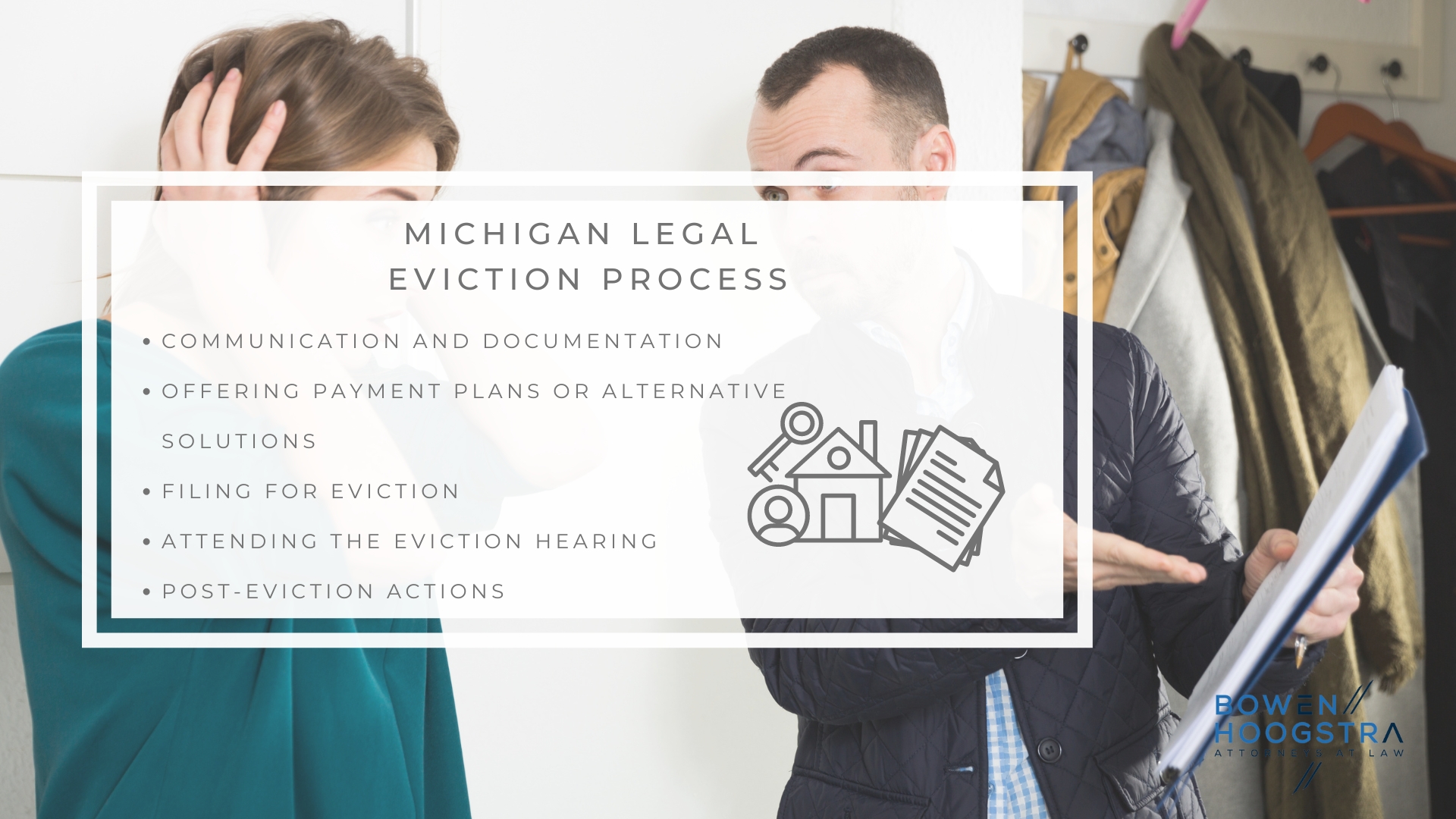Michigan landlord-tenant laws are designed to establish a fair and balanced framework for both landlords and tenants engaged in rental agreements. These laws outline the rights and responsibilities of each party, ensuring that both landlords and tenants have clear guidelines to follow. For instance, landlords have the right to collect rent and security deposits. Tenants, on the other hand, are responsible for paying rent on time and keeping the unit in good condition.
Rental agreements and lease terms can take the form of written or verbal contracts, though written agreements provide more clarity and legal protection. If the lease term is one year or longer, it must be in writing and signed by both parties. The lease agreement should cover essential details such as the rental period, rent amount, due date, payment methods, rules for rent increases, and terms for security deposits.
In the event that a tenant does not pay the rent as agreed upon, landlords must proceed cautiously and systematically. While non-payment of rent can be frustrating, it’s crucial to follow the proper legal procedures to protect both parties’ rights.
- Initiating the Rent Collection Process
- Filing for Eviction
- Attending the Eviction Hearing
- Post-Eviction Actions
Initiating the Rent Collection Process
The initial step involves clear communication and fair resolution. As the landlord, you should reach out to the tenant to understand the reason for non-payment.
Communication and Documentation
When rent is overdue, send a formal notice to the tenant indicating the missed payment. The notice should detail the outstanding amount, the due date, and a request for immediate payment. State the consequences of continued non-payment and provide a reasonable deadline for rectification.
Throughout the rent collection process, maintain a thorough record of all communication between you and the tenant. This includes emails, letters, text messages, and any other forms of correspondence. Clear documentation can be valuable in case the situation escalates and legal action becomes necessary.
Offering Payment Plans or Alternative Solutions
If the tenant is facing temporary financial difficulties, consider initiating negotiations or mediation discussions. This approach involves open communication to understand their circumstances and, if possible, create a revised payment plan that both parties can agree upon.
In cases of genuine financial hardship, assess the tenant’s situation sensitively. Collaborate on creative solutions that could include extended deadlines, partial payments, or alternative arrangements. Prioritize maintaining a positive landlord-tenant relationship while ensuring your financial interests are also met.

Filing for Eviction
If communication doesn’t lead to a resolution, you can serve a “Demand for Possession.” This formal notice specifies the amount owed and provides a specific period, usually seven days, within which the tenant must pay the rent or vacate the premises. It’s a formal way to show the seriousness of the situation and gives the tenant a last chance to fix things before more serious steps are taken.
If the tenant still does not pay the rent or leave the property, you may need to initiate eviction proceedings by filing an official complaint with the local district court. The complaint outlines the details of the rent non-payment and the steps taken so far to remedy the situation. A copy of the “Demand of Possession” notice and a copy of the lease agreement should be attached alongside the complaint. Filing the complaint marks the official start of a formal legal procedure, requiring the court’s intervention to determine the outcome of the case.
Attending the Eviction Hearing
Eviction hearings follow specific court procedures and rules, and it’s important to adhere to them closely. Arrive on time, dress appropriately, and conduct yourself professionally. Be respectful to all parties involved, including the tenant and the judge. Respect the court’s decorum and follow instructions provided by the judge. Engage in a clear and concise manner when presenting your case and answering any questions from the judge.
At the eviction hearing, the judge will review the evidence presented by both parties and listen to their arguments. If the judge rules in your favor and the tenant is found to be in breach of the lease agreement, the court may issue an eviction order. However, if the judge finds insufficient evidence or legal errors, the case might be dismissed, and the tenant may be allowed to remain on the property. Hiring a competent Muskegon attorney to represent you during eviction hearings increases your chances of success and ensures that the eviction process is conducted within the bounds of the law.
Post-Eviction Actions
After eviction, you can initiate legal actions to recover unpaid rent and damages incurred during the tenancy. Small claims court provides a simplified and relatively speedy process for recovering smaller amounts of money owed.
With the tenant removed from the property, you must ensure that the property is secured and that any necessary repairs or maintenance are addressed promptly. Once the property is in suitable condition, you can begin the process of finding new tenants.
Consult With Muskegon Attorney Now
If you’re a landlord facing the challenging situation of a tenant not paying rent, Bowen Hoogstra Law is here to guide you through the legal process. Our dedicated team of experienced Muskegon attorneys can provide you with the necessary legal support, from initiating proper notices to navigating court proceedings. Call us now at (231)-726-4484 or reach us here to schedule a consultation.

